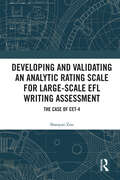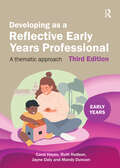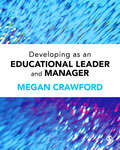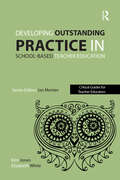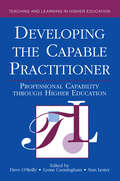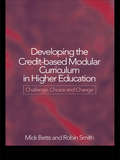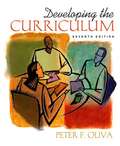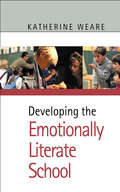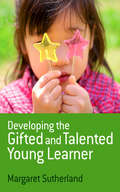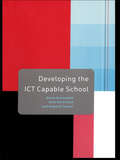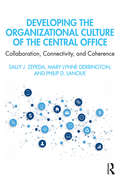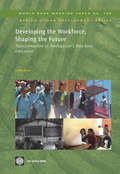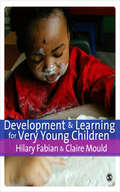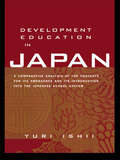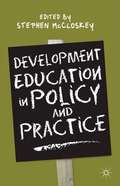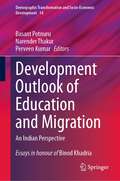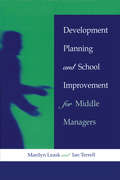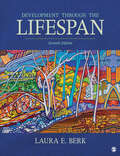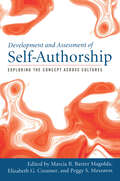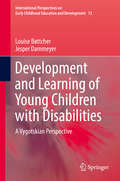- Table View
- List View
Developing and Validating an Analytic Rating Scale for Large-Scale EFL Writing Assessment: The Case of CET-4
by Shaoyan ZouThe debate between holistic and analytical scoring methods in second language assessment has long persisted. This book addresses the effectiveness and validity of the holistic rating scale used in China’s high-stakes CET-4 (College English Test Band 4) writing tests via systematic case study analysis.Using a multi-phase, mixed-methods research methodology, the author creates and validates a new analytical rating scale that redefines and operationalizes critical aspects of writing assessment. Through extensive empirical evidence, including rater cognition studies, expert reviews, and Rasch-based descriptor calibration, the author reveals the limitations of holistic scoring systems and demonstrates the necessity and validity of analytical methods. The author convincingly argues that this new scoring method translates to a more transparent, fair, and diagnostic model for large-scale EFL writing assessment.This book is an essential reference for researchers in applied linguistics, language assessment, and English language education. It also offers valuable insights for assessment specialists, test developers, and language policymakers seeking more effective evaluation frameworks.
Developing as a Reflective Early Years Professional: A Thematic Approach (Early Years)
by Carol Hayes Ruth Hudson Jayne Daly Mandy DuncanHelps early years students and practitioners to get to grips with the key issues, through a critical and thematic approach which focuses on reflective practice.Theories and research into the nature of reflection are examined, how they can be used, and how they can improve practice, producing a more responsive and thoughtful, research-based workforce for young children and their families.In this third edition there is greater emphasis on issues related to inclusion and diversity, mental health and communication with parents. New pedagogic features include Team Talk designed to get all members of a work-based team to pool their expertise and knowledge, and to think critically and reflectively upon aspects that may directly affect their settings. There is also a new Evidence Informed Research Practice and Reflection feature which offers questions that emphasise the importance of up-to-date research material informing practice within a setting.
Developing as an Educational Leader and Manager
by Megan Crawford'This book is refreshing and distinctive. It takes the individual as the starting-point and builds outwards from there, to the vital but often neglected interpersonal dimension and the turbulent contexts of modern education. Vignettes help to make the theory concrete and activities bring the reader right into the frame.' - Ron Glatter, Emeritus Professor of Educational Administration and Management, The Open University and Hon. President of BELMAS Effective leadership combines organisational skills and personal qualities. Building on notions of leadership at all levels, this book contains an invaluable bank of creative ideas to help teachers already in management positions, as well as those just starting out, to reflect on their personal and leadership development. With a focus on organisational improvement and leading strategically within changing policy contexts, chapters interrogate key leadership issues such as managing people, values and context. Examples from the UK and internationally further demonstrate how to develop as a successful and sustainable leader. Content includes: · the influence of local and national contexts; · accountability; · working with stakeholders across boundaries and borders; · approaches to change; · becoming a strategic leader; · the educational leader as researcher. This is an essential resource for practising and aspiring educational leaders and managers and students on postgraduate or personal development courses, in the UK and internationally.
Developing as an Educational Leader and Manager
by Megan CrawfordEffective leadership combines organisational skills and personal qualities. Building on notions of leadership at all levels, this book contains an invaluable bank of creative ideas to help teachers already in management positions, as well as those just starting out, to reflect on their personal and leadership development. With a focus on organisational improvement and leading strategically within changing policy contexts, chapters interrogate key leadership issues such as managing people, values and context. Examples from the UK and internationally further demonstrate how to develop as a successful and sustainable leader. Content includes: The influence of local and national contexts Accountability Working with stakeholders across boundaries and borders Approaches to change Becoming a strategic leader The educational leader as researcher This is an essential resource for practising and aspiring educational leaders and managers and students on postgraduate or personal development courses, in the UK and internationally.
Developing outstanding practice in school-based teacher education (Critical Guides for Teacher Educators)
by Elizabeth White Ian Menter Kim JonesThis book is designed to help the growing group of school-based teacher educators and those based in higher education develop excellent professional practice across their institutions. The first part of the book provides personal challenges to teacher educators, helping them to develop their own identity beyond that of being a classroom teacher and to recognise the values, knowledge and practices that are unique to them as part of the international community of teacher educators. This includes how to develop their pedagogy to embrace the needs of their trainees, and a realistic approach to developing an academic and scholarly aspect to their identity. The second part of the book describes some of the themes that underpin outstanding provision in teacher education including a broad curriculum, an enquiry-based approach, building a learning community, developing reflective practitioners, having an ethos of high aspiration, evaluation of impact and strong partnerships. Theory and practice are closely linked throughout with illustrations drawn from a variety of different settings.This book is part of the successful Critical Guides for Teacher Educators series edited by Ian Menter.
Developing the Capable Practitioner: Professional Capability Through Higher Education (Teaching And Learning In Higher Education Ser.)
by Dave O’Reilly Lynne Cunningham Stan LesterThis volume presents an edited compilation of papers about the process of developing capable professionals and practitioners in every field in higher education. Current developments are reviewed, covering the issues raised in the Dearing Report, and the importance of self-management is emphasized.
Developing the Credit-Based Modular Curriculum in Higher Education: Challenge, Choice and Change
by Robin Smith Mick BettsThis text provides guidance for building curriculum structures and examines the models that can be used. Options such as accreditation of prior and experiential learning, incompany accreditation, work-based learning,
Developing the Curriculum
by Peter F. OlivaThis highly readable text guides students step-by-step through the process of curriculum development, providing a solid foundation of key models and concepts and issues pertaining to curriculum today. Developing the Curriculum, Seventh Edition, full of references to classic and contemporary curriculum works, provides students with a synthesis of historic and contemporary principles and practices associated with creating an effective curriculum. In addition, the author introduces a model that combines curriculum and instruction and carefully explores issues and challenges at each stage.
Developing the Emotionally Literate School
by Dr Katherine Weare`As someone with an interest in emotional literacy and in developing emotional literacy work in schools, I found this book an impressive resource. I would recommend it for those interested in this area, those working within schools on emotional literacy, and for school staff interested in developing their schools as emotionally literature organizations' - Debate `This is an authoritative and scholarly book that does not attempt to offer a simple fix-it solution but one that should lead to an informed and workable approach that will address the needs and circumstances of individual schools as such . I would recommend it as an essential read for anyone contemplating the research or promotion of emotional literacy in school' - Special Children `There is much to encourage exploration by schools, educators and managers in an informed way. Helpful appendices list experienced agencies schools may approach in their work on emotional well-being'- Emotional and Behavioural Difficulties `The book provides a useful guide to ways in which school policies for promoting emotional wellbeing can be developed' - Times Educational Supplement, Teacher `This book is written in a refreshingly well-balanced style and it deserves a similarly even-handed review. Katherine Weare never exaggerates a point or pretends to have found the Holy Grail. Instead; each argument is carefully counter pointed by a caveat' - Nurturing Potential `This is a handbook for teachers and LEAs with clearly headed sections, useful tables and list of resources and contacts. There are helpful suggestions for auditing emotional literacy in schools, deciding whether to use off-the-shelf programmes, tailoring programmes to the school's own needs, and working with the wider community' - The Psychology of Education Review 'Visionary and easy to read. This vision resides in the authors' convictions about the vital role schools can play in developing and widening the literacy of emotions... worth reading... opens up a picture of what can achieved in schools in the best interests of the children' - Young Minds Magazine `Katherine Weare brings a good track record to this useful handbook. The full list of contacts, sources of support and resources and the useful bibliography are clearly a product of her comprehensive knowledge of the field in UK and beyond. They provide a solid platform for future researches' - Journal of In-Service Education Emotional literacy refers to our ability to understand and use information about our own and others' emotional states, with skill and competence. It is increasingly accepted in schools, and this book shows how it is central to mainstream education. The author defines concepts and terms in ways that make sense to practitioners, outlines the scientific evidence behind the concept, explores ways in which schools can become more emotionally literate, and demonstrates the educational benefits. The book is a practical and up-to-date account of ways in which schools can use emotional literacy to realize their goals of school improvement and effectiveness, increased learning, more efficient management of teaching and learning and improved relationships. Katherine Weare shows how emotional literacy can help address persistent educational problems, such as emotional and behavioural disturbance, school exclusion, and teacher stress and disaffection. Emotional literacy is relevant to mainstream education, is most effective when it permeates the whole school culture, ethos, relationships and management. It is as relevant for secondary as it is for primary students, and applies to teachers and parents as well as to students.
Developing the Gifted and Talented Young Learner
by Dr Margaret Sutherland'This book is an essential resource for all those in Early Years settings; providing invaluable information about addressing the wide range of aspects involved in developing effective provision for able learners' - Nursery World 'This book is essential reading for all those involved in Early Years. It proves that good provision for Gifted and Talented is good provision for all children.' - Johanna M Raffan, Founder Director, NACE Do you want to know more about how you can influence and impact gifted young children's beliefs about their ability? This book explores the way staff impact learner beliefs about ability and suggests ways that staff can support young children as they develop. The book contains practical ideas for: - giving feedback and praise - structuring activities to help shape and recognise high ability - creating a challenging learning environment - developing citizens of the future. Aimed at children who are gifted and talented, the book is applicable to staff seeking to shape and influence learning for all children in early years settings.
Developing the Global Student: Higher education in an era of globalization (Internationalization in Higher Education Series)
by David KillickDeveloping the Global Student addresses the question of how students of higher education can emerge from their university life better equipped to dwell more effectively, ethically, and comfortably amidst the turmoils of a globalizing world. It does this from a number of theoretical perspectives, illustrating the nature of the personal and educational challenges facing the individual student and the teaching professional. The book explores the massive social changes wrought by the technologies and mobilities of globalization, particularly how present and future generations will relate to, work with and dwell alongside the global other. It outlines a range of social, psychological and intercultural perspectives on human tendencies to seek out comfort among communities of similitude, and illustrates how the experience of life in a global era requires us to transcend the limits of our own biographies and approach university education as a matter of knowledge deconstruction and identity reconstruction, rather than reproduction. This book brings these considerations directly into the daily business of higher education by drawing out the implications for practice at a number of levels. It examines: the implications of a globally interconnected world and individual biographies for the design of the curriculum; a holistic view of learning in the context of the need to develop the global self; what the impact on non-academic practice will be if universities as institutions are to enable these changes; ways in which the broader student community can transform to offer an experience which is more supportive of the development of global selves. Linking theoretical perspectives to present a model of learning as change, this book will be of great interest to those working in higher education, and particularly to anyone involved in policy design and the delivery of the student experience.
Developing the ICT Capable School
by John Parkinson Steve Kennewell Howard TannerThis book helps readers to improve the development of ICT capability through understanding the factors at work in whole school contexts. Based on research that examined schools' approaches to the development of pupils' ICT capability and identified the factors which lead to success, it provides practical advice, but with clear justifications in terms of well-researched principles and illustrations. It covers issues specific to both primary and secondary phases of education together with a range of common concerns and will be of use to practitioners and school staff involved in planning and delivering ICT training. This title will therefore provide readers with: Greater understanding or personal ICT capability Knowledge of effective management, teaching methods and co-ordination strategies for ICT Understanding of the importance of a whole school approach
Developing the Organizational Culture of the Central Office: Collaboration, Connectivity, and Coherence
by Sally J. Zepeda Mary Lynne Derrington Philip D. LanoueCentral office resources are one of the largest assets in making meaningful change in schools, and this important book guides aspiring district leaders to take up the challenge to transform their schools, while at the same time balancing their core responsibilities. This book helps readers rethink the impact of central office on system and school initiatives, understand and apply transformational thinking, and change strategies at the central office to develop new instructional designs, create new opportunities to prioritize human and fiscal resources, and establish new leadership approaches founded on systems review and change. Full of exemplars from the field, questions for discussion, and suggested readings, this valuable textbook is for use in educational leadership preparation programs.
Developing the Workforce, Shaping the Future: Transformation of Madagascar's Post-basic Education
by Sajitha BashirWith challenges similar to those faced by a number of low income countries, Madagascar faces critical policy choices with respect to post-basic education. Enrolment ratios in senior secondary education and tertiary education are 10 percent and 3 percent, respectively, among the lowest in the world. Critical skill shortages and pervasive inequities in access necessitate changes in the quantity and quality of education and skills. The increasing number of basic education completers and demographic growth are mounting pressure on the government to expand access to post-basic education. Responding to these economic and social challenges, the government has made the transformation of education one of the key priorities of the Madagascar Action Plan. However, low domestic revenues and competing demands from other sectors, including basic education, limit the room for maneuver. Caught between these two pincers, policy makers often choose to sacrifice quality over expanding access or are unable to develop a long term vision. 'Developing the Workforce, Shaping the Future' presents Madagascar's core challenges and argues persuasively that the time for transforming the post-basic education system is now. It documents the poor performance of the post-basic education system in the areas of quality and relevance, internal efficiency, equity and financial inefficiency. The report presents a sequence of prioritization of reforms, focusing on improving education content and linkages with the economy, increasing coverage cost-effectively through the adoption of new planning norms for public institutions, utilization of the private sector and innovations in open/flexible learning and creating the enabling framework through reforms of governance, finance and management. The report provides a convincing reform scenario for a low income country, with actions to be undertaken in the medium and long term to sustain the development of post-basic education in an environment of limited public resources and implementation capacity. Policy makers in other developing countries will find this report useful to gauge their own strategies for post basic education.
Development & Learning for Very Young Children
by Claire Mould Dr Hilary Fabian'[T]his book has been well planned and provides information which is relevant for students and teachers alike in supporting teaching and learning. In particular, the practical aspects of group tasks and discussion points enable the reader to develop their reflective skills through the knowledge gained' - ESCalate 'This informative and thought-provoking collection of essays brings together theory, policy and practice for practitioners working with children aged from birth to three years old...It would be a great resource for students' - Nursery World 'This is a very well edited collection easily accessible to everyone involved in the early years, with the common thread being the holistic nature of very young children's learning. Using the contents of the different chapters for reflection and analysis, those implementing the new Early Years Foundation Stage will be able to promote and enhance children's development and learning experiences and certainly their own practices...This book powerfully reminds readers of what is at the heart of their care and learning interactions with babies and young children' - Professor Emeritus Janet Moyles, Play Consultant With a focus on the most critical years in a young child's development, this book brings together the essential theory, policy and practice for everyone working with young children. Concentrating on the 0 to 3 age range, the book considers all relevant legislation such as Every Child Matters and the new Early Years Foundation Stage. The content is organized into four sections: - development and learning; - policy to practice; - leadership and management; - establishing effective relationships. Examining the influence of policy on practice, issues covered include the stages of child development, observing young children, making partnerships with parents, building relationships within and between teams, working in a multi-agency way and creating a caring and stimulating environment. To illustrate practice and aid reflection, the chapters have: - chapter objectives; - case studies; - group tasks; - discussion points; - recommendations for further reading; - useful websites. Suitable for all early years students and practitioners, it is a must-have resource.
Development Administration, M.A. Public Administration Final Paper-IV, SDE AU
by Prof. B. Venkatachalapathi Prof.Y.Gurappa NaiduThis is the prescribed textbook to the students of MA Final Public Administration Paper-4 for the subject Development Administration, at School of Distance education, Andhra University
Development Education in Japan: A Comparative Analysis of the Contexts for Its Emergence, and Its Introduction into the Japanese School System (Reference Books in International Education)
by Yuri IshiiThis book aims to provide an explanation for the slow introduction of Development Education in Japan.
Development Education in Policy and Practice
by Stephen MccloskeyDevelopment education is a radical form of learning that addresses the structural causes of poverty, inequality and injustice in the global North and South. It equips learners with the skills, values, attitudes and understanding needed to take effective action toward social change. This comprehensive collection rigorously debates development education practice in the formal and informal education sectors and the policy environment in which it is delivered. It affirmatively points to the transformative power of education to engage learners in actions that tackle the underlying factors that sustain poverty. With neoliberalism in crisis and poverty enveloping the global North, the book argues that development education has an important role to play in debating alternative paradigms of development informed by social need and sustainability. The global cast of authors with extensive experience of the sector provide an indispensable guide to a burgeoning area of education.
Development Of Prototype Tactile Instructional Materials In High School Geometry For Students With Vision Loss
by Allan Rosal MesogaResearcher: Allan Rosal Mesoga Title of Thesis: Development of Prototype Tactile Instructional Materials in High School Geometry for Students with Vision Loss Degree: Master of Arts in Education Specialization: Special Education (Teaching Children with Visual Impairment) Institution: College of Graduate Studies Philippine Normal University Advisers: Julieta A. Gregorio, Ph.D. Rosemarievic Villena-Diaz, Ph.D. Key Concepts: High School Geometry, Competencies, Vision Loss, Tactile Materials The purpose of this study is to develop prototype tactile instructional materials in High School Geometry for students with vision loss. Specifically, this study aimed to Develop and Content Validate the Prototype Tactile Instructional Materials in High School Geometry for Students with Vision Loss. To accomplish this, the study sought to achieve six objectives: (1) Analyze the content of the geometry skills in the Basic Education Curriculum (BEC) from kindergarten, from elementary up to secondary school, to determine their prerequisites, sequences, and levels of difficulty, (2) Analyze literature on mathematics tactile materials in advanced countries, (3) Identify the adaptations and modifications that can be incorporated into locally constructed materials for teaching geometry skills to blind students with vision loss in secondary school, (4) Develop prototypes of tactile instructional materials for selected geometry skills in the secondary school curriculum, (5) Establish the content validity of the prototype tactile instructional materials, and (6) Revise the prototype materials as needed and prepare the final tactile instructional materials for learners with visual loss in secondary school. The research for this study was carried out in two stages. The first stage focused on data gathering as well as on the preparation and validation of prototype tactile instructional material in geometry for students with vision loss. In the second stage, the prototype tactile instructional materials were revised, and the final copy of prototype tactile material was prepared. There are two (2) groups of respondents in this study. The first group consists of two (2) mathematics professors, one (1) special education professor, and one (1) special education teacher. Thus, the first group of respondents is made up of four (4) teachers, or experts. This group established the content validity of the prototype tactile instructional material in terms of the competencies set by the Department of Education. The second group of respondents is made up of nine (9) students with vision loss. This group established the content validity of the prototype tactile instructional material in Geometry as instructional materials for students with vision loss. The first group of respondents used the five (5) criteria for evaluating the prototype tactile instructional materials as adapted from the study of Cadiente (2006).
Development Outlook of Education and Migration: An Indian Perspective (Demographic Transformation and Socio-Economic Development #14)
by Basant Potnuru Narender Thakur Perveen KumarThis book describes the movement of un-skilled and skilled workers both within and from India and its fallout on education and development. It furthers the evidence on the contribution of education and international migration in development with specific reference to India as a major source country of migrant population. The book also distinguishes the underlying linkages and distinction between international and internal migration on the one hand and the education and development experience on the other. It brings forth the causes and development experiences of both migrations to a common platform to gauge on their similarities and differences in the lens of education and development. As such, this book contributes to the scant literature on Indian experience of internal and international migration and sheds light on future migration policy and course correction necessary for places and countries of migrant origin.
Development Planning and School Improvement for Middle Managers
by Marilyn Leask Ian TerrellClassroom teachers moving to positions of increased responsibility often have very little formal training for their new role. This book provides guidelines for best practice in the necessary skills for success - planning, management and accountability.
Development Through The Lifespan
by Laura E. BerkNow published by SAGE! With its seamless integration of up-to-date research, strong multicultural and cross-cultural focus, and clear, engaging narrative, Development Through the Lifespan, by best-selling author Laura E. Berk, has established itself as the market’s leading text. Known for staying current, the fully updated Seventh Edition offers the latest, most relevant research and applications in the field of human development. New and compelling topics, rich examples, coupled with Berk’s signature storytelling style, makes this edition the most accessible and engaging text available to students today. Included with this title: LMS Cartridge: Import this title’s instructor resources into your school’s learning management system (LMS) and save time. Don’t use an LMS? You can still access all of the same online resources for this title via the password-protected Instructor Resource Site. Learn more.
Development Through The Lifespan
by Laura E. BerkNow published by SAGE! With its seamless integration of up-to-date research, strong multicultural and cross-cultural focus, and clear, engaging narrative, Development Through the Lifespan, by best-selling author Laura E. Berk, has established itself as the market’s leading text. Known for staying current, the fully updated Seventh Edition offers the latest, most relevant research and applications in the field of human development. New and compelling topics, rich examples, coupled with Berk’s signature storytelling style, makes this edition the most accessible and engaging text available to students today. Included with this title: LMS Cartridge: Import this title’s instructor resources into your school’s learning management system (LMS) and save time. Don’t use an LMS? You can still access all of the same online resources for this title via the password-protected Instructor Resource Site. Learn more.
Development and Assessment of Self-Authorship: Exploring the Concept Across Cultures
by Marcia B. Baxter Magolda Elizabeth G. Creamer Peggy S. MeszarosThis book brings together new scholarship that expands and refines the concept of self-authorship across cultures. It adopts a constructive-developmental approach to self-evolution that emphasizes the interaction of personal characteristics and contextual influences on individuals’ construction of knowledge, identities, and relationships. Individual chapters cover subjects from populations as varied as Dutch students, male and female Bedouin and Jewish adolescents, African American male and female adolescents in economically depressed areas of the US, Latino/a college students grappling with ethnic identity and dissonance, Australian college females preparing to be childcare workers, and finally a comparative study of Japanese and U.S. college students’ epistemic beliefs.The book concludes by addressing questions about the challenges and opportunities involved in developing a valid measure of self-authorship that is less time and expertise-intensive than the in-depth one-on-one interview employed until now; and offering an outline of future theoretical and methodological research needed to further our understanding of self-evolution in general and self-authorship in particular.
Development and Learning of Young Children with Disabilities
by Louise Boettcher Jesper DammeyerThis book introduces current theories and research on disability, and builds on the premise that disability has to be understood from the dialectical dynamics of biology, psychology, and culture over time. Based on the newest empirical research on children with disabilities, the book overcomes the limitations of the medical and social models of disability by arguing for a dialectical biopsychosocial model. The proposed model builds on Vygotsky's cultural-historical ideas of developmental incongruence, implying that the disability emerges from the misfit between individual abilities and the cultural-historical activity settings in which the child with impairments participates. The book is a theoretical contribution to an updated understanding of disability from a psychological and educational perspective. It focuses on the first years of the life of the child with impairment, and travels through infancy, toddler, preschool and early school age, to track the developmental trajectories of disability through the dialectical processes of cultural, social, individual, and biological processes. It discusses a number of themes that are relevant for the early development and support for children with various types and degrees of disability through the lens of Vygotsky's cultural-historical developmental theories. Some of the themes discussed are inclusion, mental health, communication, aids and family life.
